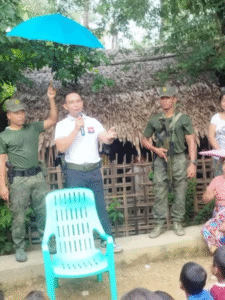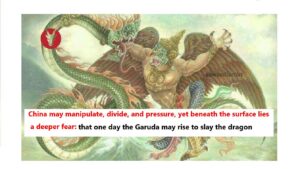Article 3 – China’s Double Game
Intro:
The final article in this series turns directly to Beijing’s double game. From the 2020 elections to the present, China’s miscalculations have deepened Myanmar’s turmoil — caught between fear of the West and fear of losing influence on the ground.
Translated and edited from Thangpet Thanga’s Burmese article.
In Myanmar’s turbulent landscape, China—often referred to as Pauk Phaw—is playing a dangerous double game. What began as calculated maneuvers to secure influence after the 2020 elections has now spiraled into confusion, miscalculations, and mounting sacrifices.
From Elections to Coup
Before the 2020 election, China encouraged the formation of a proxy party. Yet, the NLD sidelined it. When the NLD won and Chinese Foreign Minister Wang Yi rushed to meet Daw Aung San Suu Kyi, it seemed Beijing was hedging its bets. Not long after, the military coup overturned the political table.
But the coup did not deliver the stability China wanted. The people rose in massive resistance. Beijing’s attempt to manipulate events through the so-called “Tiger Operation” and by encouraging the Northern Three alliances (KIO, MNDAA, TNLA) to launch offensives backfired. The weapons supplied by Wa—under Chinese blessing—fueled not only conflict but also the flood of narcotics across the region.
A Gamble Gone Wrong
Ironically, the very offensive Beijing sponsored ended up energizing the revolution and strengthening the NUG’s position. When this displeased China, it tried to distance itself from the NUG and worked to undermine it. The Northern Three and communist-aligned groups began clashing with the NUG, and even within the NUG, divisions between communist and democratic factions emerged.
China soon realized its actions were producing more harm than good. It tried to rein in the Northern Three, only to be rebuffed. As long as the groups held weapons, they were unwilling to fully submit to Pauk Phaw’s dictates. Beijing responded by attempting to cut off their lifeline: the Wa arms route.
Weapons, Narcotics, and Shifting Routes
Arms and narcotics travel together, and when the supply chain is disrupted, the ripple effects are immense. Recently, a Naga news outlet accused the CNF of trafficking drugs. Given China’s long and murky ties with Naga groups, this raises suspicions. Is Beijing targeting CNF because of its closeness to Western allies? Or is it signaling that narcotics routes have shifted toward Naga territory?
Either way, China is tightening its grip. Reports suggest arms supplies to the Arakan Army have been curtailed, while narcotics flows face new disruptions. Whether Yangon becomes an alternative route remains unclear.
Beijing’s Western Phobia
What is undeniable is Beijing’s profound fear of the West. Any organization perceived as leaning toward Western influence is infiltrated, weakened, or attacked through multiple methods. The fear of a “Western foothold” in Myanmar drives Beijing’s paranoia.
At the same time, Russia’s rise gives Beijing some protection from US sanctions. Washington cannot tax China heavily without provoking Moscow. Instead, India—“Pa Bu”—absorbs the pressure. Sharing borders with Kachin, New Delhi is being forced to rethink its strategy carefully.
Endless Sacrifices
The cost of China’s schemes has been paid in blood. Many lives have already been sacrificed, and more will be lost as Beijing presses forward. Yet, China does not fully trust Min Aung Hlaing either.
One certainty looms: in the coming months, Beijing will intensify pressure—politically, militarily, and economically—on KIO, CNF, NUG, KNDF, and KNU.
China’s “Pauk Phaw” narrative is no longer about friendship. It is about control, fear, and manipulation. Behind its maneuvers lies a deeper anxiety: that one day, the mythical Garuda may rise—and slay the dragon.
Closing note:
What emerges is a portrait of a superpower obsessed with control but plagued by insecurity. China may manipulate, divide, and pressure, yet beneath the surface lies a deeper fear: that one day the Garuda may rise to slay the dragon.






